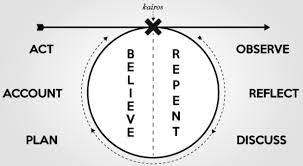Spirit-led discernment and decision making can feel like an elusive concept to many so here is a short post with some tips and principles for spiritual discernment.
Discernment: the capacity to recognize and respond to God’s leadership and guidance both personally and in community.
Spirit-led Decision making: when we experiment to open up space in our devision making process to look for and listen to the Holy Spirit.
Here is the decision making tool kit from my book Make A Move – How To Stop Wavering and Make Decisions In a Disorienting World – Decision Making Tool Kit
Steps of Experimenting (I detail these in the book – grab a free copy at the connections table anytime)
- Define your question
- Do your research
- Determine your first experiment
- Name the steps of your experiment
- Analyze and review
At the core of discernment and decision making is the choice and ability to listen on many levels:
- Listen to what you sense spiritually in both prayer and action – does a word, phrase or image come to your mind?
- Listen through scripture – what seems to be highlighted for you?
- Listen to your emotions – they can be a guide. With curiosity ask God what they may mean for this process.
- Listen to your thought process – what do you notice is on your mind?
- Listen to others – is the Holy Spirit speaking through others?
As you listen on these many levels – look for what God may be highlighting for you. We often call this a “kairos moment” from the greek concept of time not only as linear, but that God actively breaks into our chronological time to get our attention.
Here are some examples of what different kairos moments may look like in an excerpt from my book Make A Move – How To Stop Wavering and Make Decisions In a Disorienting World – Kairos Examples.
Kairos moments can be experienced during prayer, discussion with others, or when you are having an experience.
When we experience a kairos moment, there is simple process we encourage you to follow:
- Observe (What was happening? How did you react?)
- Reflect (Why did you react as you did? What did this mean?)
- Discuss (Who did you talk to?)
- Plan (What was your response? How did you plan to learn and grow?)
- Account (Who kept you accountable?)
- Act (What was the outcome of putting your plan into action?)
You can watch a short teaching from Pastor Michael teaching this process during a sermon last year: Kairos Circle



Recent Comments